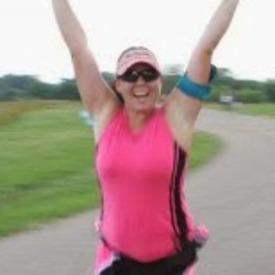Eating and training

BrigFowler
Posts: 9
I need some help figuring out when/how to eat when doing long training runs. I'm a noob so 7-10 miles is still considered a long run for me. :-) (I am trying to lose weight)
For example, this morning I ran 1053 calories worth. I've eaten breakfast (before) and lunch (after). I've eaten more than I do on a normal day and I've only netted 137 calories. This usually sets me up for a binge later on in the evening -- when I'll start going WAY over my calorie allotment for the day.
What does that day look like for someone with more experience than I?
Here's more specifically what I have eaten up to this point:
Breakfast - 1/2 energy bar & banana
Waited 30 mins and did my run.
During the run I ate a powergel pack at my 3.5 mile turn around.
Immediately following the run, I ate the other half of the energy bar.
(Because my run was in the late morning, it was lunch time by the time I got home)
Lunch - 5 ounces b/s chicken thigh, 2/3 cup of rice, veggies, olive oil.
And I'm still hungry.
Thanks in advance for your help!
Brig
For example, this morning I ran 1053 calories worth. I've eaten breakfast (before) and lunch (after). I've eaten more than I do on a normal day and I've only netted 137 calories. This usually sets me up for a binge later on in the evening -- when I'll start going WAY over my calorie allotment for the day.
What does that day look like for someone with more experience than I?
Here's more specifically what I have eaten up to this point:
Breakfast - 1/2 energy bar & banana
Waited 30 mins and did my run.
During the run I ate a powergel pack at my 3.5 mile turn around.
Immediately following the run, I ate the other half of the energy bar.
(Because my run was in the late morning, it was lunch time by the time I got home)
Lunch - 5 ounces b/s chicken thigh, 2/3 cup of rice, veggies, olive oil.
And I'm still hungry.
Thanks in advance for your help!
Brig
0
Replies
-
I eat bigger portions basically… I am usually really hungry and can eat plenty… sometimes I do get some treats along with it and a beer.
My suggestion is to make bigger portion sizes.
Before long runs, I eat oatmeal with peanut butter but after I come home (if it is a morning run) I eat another breakfast, maybe it is eggs and toast or something like that.
Maybe eat a whole bar before your run and another afterward, then eat lunch?
Try making a protein shake/smoothie, too.0 -
if you can't eat enough, then drinking it is fine too! i sometimes make a smoothie but include oats in there and some peanut butter. I never eat before a run of under 12kms. if im going over that, then my usual is 2 pieces of toast with pb and banana about 90 mins prior. i'll wait for about 30 mins after i get home and then have eggs on toast or something like that. then will eat as i feel like for the rest of the day.
the issue is though that it's harder than you think to lose weight and continue to train for distance runs. your body needs more nutrition to perform at it's best. i have another friend on here who has been training for an ultra (which he did a few weeks ago- silly bugger ran about 40 miles!), and gained 40lbs in the process.
for me, i just try to eat clean (ish) and be healthy. my focus is running for distance. once ive done my next full in may, i'll move onto something else. for now, i eat depending on when i'm hungry. i dont eat if im not. but i'm not losing any weight either!0 -
Just curious...how many calories do you normally eat day to day?0
-
You want to make sure you have a little something to eat, easily digestible an hour or tow before your run (assuming you are awake to do this, you don't need to wake up early just to eat).
You really do not need gels for 7-10 miles. Actually you don't need it until closer to 15. But you should take in some sports drink (i..e. Gatorade). This will give you some calories but also the electrolytes.
You want to try and get some calories into your body within 15-30 minutes of the run and make sure you have a good dose of protein as part of that. Your "meal" if you will should be within an hour. You can have the meal in that 15-30 minutes but if your meal is going to be farther out you do want something more quickly0 -
If you are hungry, eat. Your body is telling you it needs fuel.
Sometimes my calorie intake is higher (1900-2000) on my long run days, especially if that long run is in the morning. I don't worry about it because I still have a decent deficit. Sometimes my calorie intake is not as high and my net is really low, usually when I do my long run in the afternoon. I don't worry too much about this either, because I usually end up eating closer to maintenance the next day, so averaged over the course of the week it all works out.
As for what and when I eat....it really depends. Morning runs less than an hour, usually just coffee. If I can get up and eat at least two hours before my long run, I'll usually do an English muffin w/ a tbsp. of pb and a banana. If I can't get up to eat that early, I might just do a banana 30-60 minutes prerun. On these days I'll usually do a GU about an hour into my run. Otherwise I only do GU for 12 miles or longer.
Apparently I'm some sort of freak of nature, because I do get hungry when I run. So sometimes I'll start thinking about what I want to eat post run during my last couple of miles. Long runs are usually on Sundays, which is often an eat-out breakfast day, and I order an egg white omelet with veggies and feta cheese and rye toast and sliced tomato. Every once in a while I'll get home fries instead of the tomato. If I'm eating at home, it's usually cereal, because I love cereal. Two bowls of cereal. Sometimes oatmeal. Sometimes greek yogurt and an English muffin, depending on what I ate pre-run. Sometimes I'll indulge with a latte and a bagel.
Eat what you like. Experiment to find what works for you. Go ahead and eat a little more, just keep an eye on the scale and adjust if things are not working out.0 -
I eat another breakfast, maybe it is eggs and toast or something like that.
GASP! I think you just gave me permission to embrace my inner Hobbit.
;-)0 -
Because I'm a sedentary office worker, I usually eat about 1200-1400 calories a day if I don't do any exercise. If I exercise, I like to eat 50-80% of my calories earned from exercising.0
-
Hello,
Depends on your goals as the running diet to lose weight or to gain performance ( either speed, and / or length) could be quite different..
To lose, weight, I had personally success with low calories daily balance ( 80% of my base metabolism ) fueling with a lot of fiber based vegetables & low-fat carbs (White fish, white of the eggs, ...and some white poultry although I have finally given up on meat).
Now that I have reached my weight target, and that I have found in love with running so much, training 100km per week to perform ultra-trail races, I have added more cereals and lentils/peas based diet to get to 100% of base metabolism.
Fat is no more than 20-25% of my nutriment balance. I may weight in, when performing long distance - several days type race.
Breakfast is for about 40% of calories intake, and I go for 5 meals for day ( so the other ones are light in calories)
I hope this helps0 -
Eating when you are hungry is fine, the important this is WHAT you eat. I will normally have a piece of fruit at the mid-point of my morning, another at around 2 pm, and another snack around 4 prior to a 6 oclock dinner. Fresh fruit and vegetables are good because they fill you up and are not very calorie dense so you aren't hungry but you aren't packing on a bunch of excess calories either.0
-
Except on weekends, I eat from the second I wake up right to when I go to bed. After a morning run, I will typically shotgun those calories back (today I burned 900ish and ate a Chipotle burrito and guac lol) and then back to regular pacing throughout my day. Depending on the intensity of my run, I will eat varying levels of proteins.0
-
I use the TDEE method for precisely this reason... some days I run long (up to 20 mi, when in full marathon training mode) and burn crazy amounts of calories; while on my rest day, I'm a completely sedentary desk jockey. Then there are days in between that run that full range. Because I find it difficult to build a plan around that kind of wild variation, I use TDEE method; right now, I target 1800 calories every day (I used to target 1600 for a while, then 1700). If it's a very long run (say, 16+), I'm not gonna freak out if I exceed 1800; then again, I don't really freak out I exceed anyway, 'cause some days I'm under, some days I'm over, and it all balances out.
Just a thought - you may find it easier than trying to eat back exercise calories that vary wildly throughout the course of the week.0 -
Thanks, Bert! I'll look into the TDEE method. I've heard of it, I just haven't paid much attention to it. That just might be my solution.0
-
There are a bunch of calculators out there to help determine your TDEE; one popular one (and the one I used as my starting point) is Scooby's Workshop: http://scoobysworkshop.com/calorie-calculator/
I used that as my initial estimate; if I was losing too rapidly or feeling a lack of energy, I adjusted my target upwards; if you find that you're not losing (or not losing as rapidly as you'd like), you can lower your target from this.0
This discussion has been closed.








